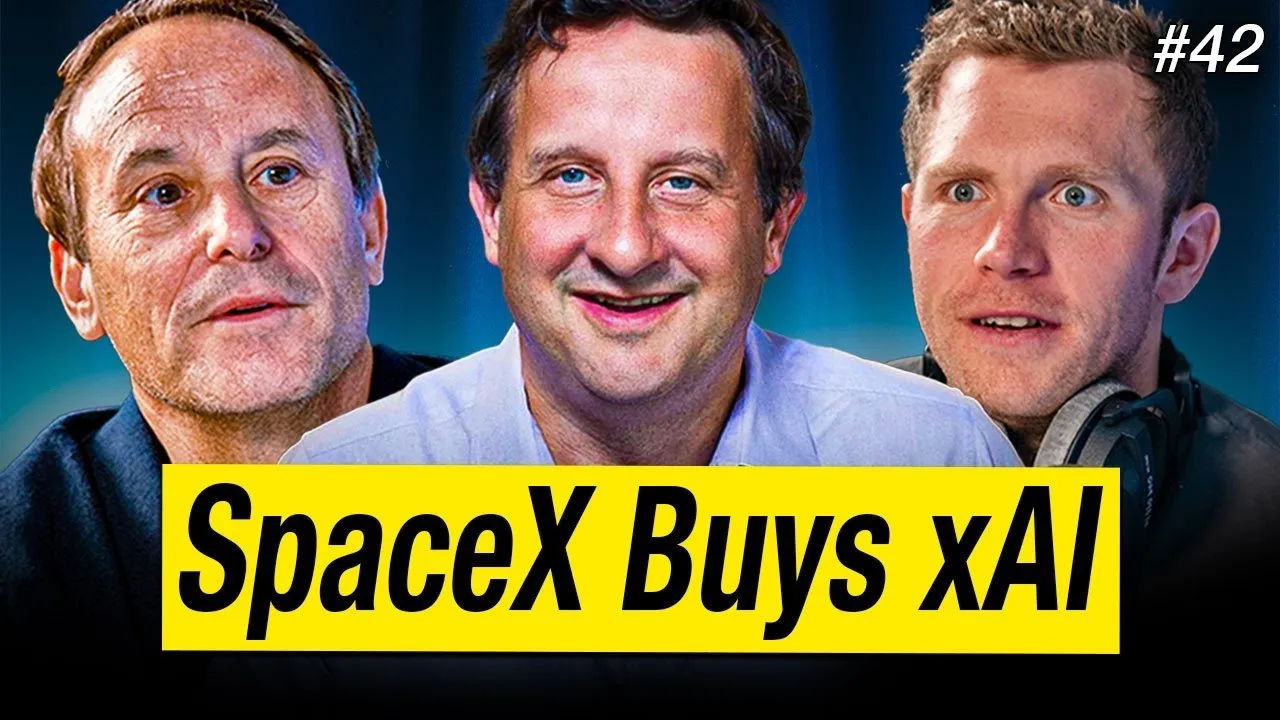Table of Contents
DOGE's systematic dismantling of government waste reveals shocking spending patterns while Trump's crypto framework and sovereign wealth fund proposals signal massive economic transformation ahead.
The All-In podcast exposes how DOGE discovered billions in questionable USAID spending, David Sacks unveils crypto legislation plans, and Antonio Gracias analyzes the future of American industrial policy.
Key Takeaways
- DOGE's investigation of USAID revealed systematic waste including $2.5 million for Vietnam EV charging stations and millions funding political media outlets like Politico and BBC
- Federal court issued temporary restraining order limiting DOGE treasury access to just two people, potentially slowing fraud investigation efforts across government agencies
- David Sacks announced bipartisan crypto framework with four key congressional committees committed to passing legislation within six months establishing clear market structure rules
- Trump's sovereign wealth fund proposal aims to monetize strategic assets like TikTok equity and federal land while avoiding traditional deficit spending approaches
- Democratic Party faces existential crisis as DOGE exposes their pro-capital policies disguised as pro-labor messaging, potentially reducing support to 15-20% of population
- Google's $75 billion AI capex investment reflects confidence in infrastructure returns, with historical six-year depreciation schedules suggesting strong ROI expectations for data center buildouts
- Massive GLP-1 study of 1.2 million patients shows 30% reduction in cardiac arrest risk plus benefits for liver failure, schizophrenia, and respiratory conditions beyond weight loss
- Job displacement from AI automation expected but historical precedent suggests productivity gains will create new economic opportunities requiring creative workforce adaptation strategies
Timeline Overview
- 0:00–3:11 — The Besties Intro Antonio Gracias: Introduction of Valor Equity Partners CEO and early Tesla/SpaceX investor joining for comprehensive policy analysis
- 3:11–31:44 — DOGE Takes on USAID: Detailed breakdown of $45 billion agency's questionable spending patterns and systematic waste fraud discovery process
- 31:44–34:00 — Sacks Breaks in from White House: Live connection from Executive Office Building discussing DOGE operations and government accountability efforts
- 34:00–46:41 — Crypto and AI Framework Development: Comprehensive explanation of four-committee legislative strategy and market structure clarity for digital assets
- 46:41–52:33 — Democratic Party's Shrinking Base: Analysis of coalition collapse and pro-capital policies masked as progressive messaging creating voter alienation
- 52:33–1:09:07 — Sovereign Wealth Fund and Breaking News: Trump's asset monetization strategy plus real-time updates on tax policy and federal court restraining orders
- 1:09:07–1:23:21 — Google's $75B AI Investment: Analysis of capex strategy, return on investment calculations, and future workforce displacement implications
- 1:23:21–END — GLP-1 Macro Study Results: Science corner covering massive VA database analysis revealing broad health benefits beyond weight loss applications
DOGE Exposes USAID's Systematic Waste and Political Influence
- USAID's budget explosion from $26 billion to $45 billion under Biden created opportunities for systematic waste, with DOGE discovering spending on transgender operas in Colombia, DEI musicals in Ireland, and EV charging stations in Vietnam. These expenditures highlight fundamental misalignment between foreign aid objectives and American taxpayer priorities.
- The agency's resistance to Trump's foreign aid freeze executive order triggered DOGE's initial investigation, with security officials attempting to prevent access to buildings and systems. This resistance pattern suggests institutional awareness of problematic spending requiring concealment from oversight authorities.
- Media funding revelations show Politico receiving $8 million annually under Biden versus $1.3 million under Trump, while BBC received $2.7 million representing 8% of annual income. Thompson Reuters consulting arm collected $120 million since 2011, with half coming during Biden administration, creating undisclosed financial relationships affecting editorial independence.
- International political interference includes funding left-wing opposition groups in Hungary and Poland through USAID channels, representing systematic attempt to influence democratic processes in allied nations. This pattern extends globally with 130 countries receiving various forms of assistance that may serve political rather than humanitarian purposes.
- Historical context reveals bipartisan nature of waste investigation efforts, with successful precedents under Harry Truman's committee saving $15 billion (quarter trillion in today's dollars) and Clinton's reinventing government initiative. Current DOGE effort represents third major attempt at systematic government efficiency improvement.
- Zero-based budgeting approach forces fundamental questions about essential government role, moving beyond incremental cuts to examine first principles of federal spending priorities. This methodology proved successful at Twitter's transformation, eliminating 80% of workforce while maintaining operational effectiveness.
David Sacks Unveils Comprehensive Crypto Legislative Framework
- Bipartisan congressional support emerged with four key committee chairmen committing to crypto legislation within six months, including House Financial Services, Senate Banking, and both agriculture committees overseeing CFTC commodity regulation. This represents unprecedented coordination across traditional jurisdictional boundaries.
- Market structure clarity will define digital assets across multiple categories including cryptocurrencies, securities, commodities, and collectibles like NFTs. The framework enables projects to transition between classifications as protocols achieve sufficient decentralization, providing regulatory certainty for founders and investors.
- Stablecoin legislation takes priority with Senator Hagerty's bill addressing immediate needs for dollar-backed digital currencies, reinforcing dollar supremacy while enabling innovation. This approach provides early legislative victory while building momentum for comprehensive market structure reforms.
- Consumer protection strategy focuses on bringing innovation onshore rather than driving activity to offshore jurisdictions like the Bahamas where FTX operated. Domestic regulation enables market differentiation between legitimate projects and fraudulent schemes, protecting investors through transparency rather than prohibition.
- SEC task force under Hester Peirce begins immediate regulatory framework development while awaiting legislative action, replacing Gary Gensler's enforcement-heavy approach with collaborative guidance. This shift from "honeypot" investigations to genuine compliance assistance encourages domestic innovation.
- Previous legislative success includes 71 Democratic House votes for French Hill's market structure bill, demonstrating potential for continued bipartisan support despite political polarization. Seven Senate Democratic votes needed for 60-vote threshold appears achievable given past voting patterns and industry lobbying efforts.
Democratic Party Coalition Collapse and Strategic Realignment
- Trump's successful transformation of Republican Party into populist pro-labor movement while Democrats inadvertently became pro-capital despite progressive messaging creates fundamental political realignment. Record stock markets, deficits, and wage suppression under Biden benefited asset owners while harming working-class voters.
- Chamath's prediction of Republican decade-long dominance based on successful coalition reformation contrasts with Democratic failure to adapt messaging to actual policy outcomes. The party's sophisticated messaging cannot hide pro-capital results indefinitely as data transparency increases through DOGE investigations.
- Kitchen table issues like inflation devastate middle-class families while benefiting productive asset owners, exposing Democratic policies' actual impact versus intended messaging. Rahm Emanuel's recent op-ed acknowledging this disconnect signals growing awareness within party leadership of fundamental strategic problems.
- Opposition to DOGE reveals Democratic misunderstanding of public sentiment regarding waste and fraud elimination, with privacy concerns about Social Security number access completely missing voter priorities. Americans care more about stolen tax dollars than bureaucratic data access protocols.
- Universal popularity of waste elimination provides Republicans with sustainable political advantage, as opposing efficiency improvements appears absurd to average voters. Democratic leadership's inability to embrace government efficiency reforms demonstrates strategic confusion about voter priorities and policy messaging.
- Coalition shrinkage to 15-20% of population seems inevitable unless Democratic Party undergoes complete strategic reset, abandoning current approach that alienates both working-class and progressive constituencies. The party lacks coherent base from which to rebuild without fundamental ideological restructuring.
Sovereign Wealth Fund Strategy and Asset Monetization
- Trump's sovereign wealth fund proposal leverages strategic asset creation like 50% TikTok equity rather than traditional natural resource extraction models used by Norway and Saudi Arabia. This approach avoids deficit spending while creating investment vehicle for government asset optimization.
- Governance structure suggestions include five elder statesmen rotating through unpaid leadership roles, with candidates like David Tepper, Stan Druckenmiller, Ken Griffin providing sophisticated investment management. Mega-billionaire requirement ensures personal financial motivation alignment with national interests.
- Industrial policy implementation through investment strategy could compete with China's systematic approach to economic development, providing stealth mechanism for strategic sector support. This approach enables market-driven capital allocation rather than bureaucratic industrial planning.
- Asset monetization opportunities include federal land sales, seized Bitcoin holdings, and strategic equity positions acquired through licensing arrangements. These assets require sophisticated management rather than bureaucratic disposal to maximize value for American taxpayers.
- Social Security integration potential offers solution to system's approaching bankruptcy through equity investment rather than treasury bond limitations. Current $6 trillion liability represents fake accounting entry that could benefit from professional investment management.
- Return on investment requirements demand careful balance between strategic objectives and financial performance, avoiding government's historical poor capital allocation while achieving policy goals through market mechanisms rather than regulatory mandates.
Google's $75 Billion AI Investment and Infrastructure Strategy
- Google's capex increase to $75 billion represents 42% jump requiring $27 billion annual operating profit increment to justify 20% return on investment. Historical six-year depreciation schedule suggests confidence in long-term infrastructure utilization and maintenance optimization through AI systems.
- Model quality leadership across broad capability spectrum provides foundation for infrastructure investment, with superior post-training and productization determining competitive advantage over pure model performance. Google's integration of AI into advertising optimization creates direct revenue impact from infrastructure spending.
- Energy efficiency focus from 2005-2021 enabled depreciation schedule extensions from two years to six years through AI-optimized maintenance and repurposing strategies. This operational excellence provides competitive advantage in infrastructure return on investment calculations.
- Return on invested capital transparency could improve market reception by segregating advertising optimization spending from speculative AI research investments. Half of capex supporting proven advertising models would demonstrate immediate ROI while experimental spending addresses longer-term opportunities.
- Competitive positioning against China requires sustained investment despite short-term market concerns, as technological leadership depends on infrastructure advantages rather than pure algorithmic innovation. Google's historical frugality and management excellence suggests prudent capital allocation approach.
- Data center density and coherence advantages from tensor processing units and custom chip development provide sustainable competitive moats, similar to early Google's cheap throwaway rack strategy that enabled cost advantages over expensive Oracle infrastructure.
Job Displacement and Economic Transformation in AI Era
- Historical precedent from agricultural revolution shows 90% job reduction in farming offset by service sector growth and new economic opportunities requiring different skill sets. Current AI transformation follows similar pattern with productivity gains enabling new business formation and creative work.
- Massive productivity increases from AI automation could drive GDP growth through enhanced output per worker rather than workforce expansion, creating economic surplus for retraining and new business development. American economic agility provides advantages over more rigid systems during technological transitions.
- Barrier reduction for company formation through AI tools enables displaced workers to become entrepreneurs more easily, with examples of million-dollar revenue companies operating with five employees demonstrating efficiency improvements. This entrepreneurial opportunity partially offsets traditional employment displacement.
- Regulatory reform necessity requires removing obstacles to creative business formation and innovation, allowing American productivity advantages to flourish during technological transition. Government's role shifts from protecting existing jobs to enabling new opportunity creation.
- Service sector expansion continues historical pattern of economic evolution, with personal coaches, organizers, and creative professionals representing jobs inconceivable during earlier technological revolutions. These opportunities emerge naturally from increased economic surplus and specialization.
- Retraining challenges acknowledge limitations of historical workforce adaptation programs, with Montreal Federal Reserve studies showing million-dollar per-worker costs for steel industry displacement. However, AI tools may improve retraining effectiveness and reduce adaptation timeframes.
GLP-1 Revolutionary Health Benefits Beyond Weight Loss
- Massive VA database study of 1.2 million patients reveals dramatic health benefits beyond appetite suppression, including 30% reduction in cardiac arrest risk, decreased liver failure, and improvements in schizophrenia and respiratory conditions. This comprehensive analysis provides unprecedented insight into drug's systemic effects.
- Gene expression cascade from GLP-1 receptor activation triggers anti-inflammatory responses and cellular repair mechanisms independent of weight loss effects, suggesting fundamental biological pathway enhancement. Clinical trials for diverse indications validate these observational findings through controlled studies.
- Risk-benefit analysis shows minimal side effects limited to abdominal discomfort including nausea, vomiting, and gastric reflux, while cardiovascular and metabolic benefits far outweigh minor gastrointestinal issues. This safety profile supports broader therapeutic applications beyond diabetes and obesity.
- Muscle and bone density concerns require mitigation through increased protein intake and weightlifting programs, but these same interventions provide health benefits independent of drug use. Proper exercise and nutrition protocols can eliminate negative effects while maximizing positive outcomes.
- Clinical trial expansion across multiple indications including kidney disease, liver problems, and mental health conditions demonstrates pharmaceutical industry recognition of broad therapeutic potential. Phase three studies will provide definitive evidence for regulatory approval across diverse medical applications.
- Decision-making complexity around wellness protocols creates cognitive burden for busy professionals, with multiple expert recommendations creating confusion rather than clarity. Simplified, evidence-based approaches would improve adoption and compliance for preventive health measures.
Common Questions
Q: Will federal courts be able to stop DOGE's investigation into government waste?
A: The temporary restraining order only limits access to two people rather than halting investigation entirely, suggesting administrative compromise rather than fundamental blockade.
Q: How realistic is passage of crypto legislation within six months?
A: Four committee chairman commitments plus previous 71 Democratic House votes suggest strong bipartisan foundation for relatively quick legislative action.
Q: Can a US sovereign wealth fund compete with natural resource-based funds from other countries?
A: Strategic asset monetization through licensing and land sales could generate comparable returns while avoiding resource dependency limitations.
Q: Will Google's $75 billion AI investment provide adequate returns given competitive pressures?
A: Historical infrastructure management excellence and six-year depreciation schedules suggest confidence in long-term utilization and return expectations.
Q: Are GLP-1 drugs safe for long-term use in healthy individuals?
A: Large-scale studies show minimal side effects while providing significant cardiovascular and anti-inflammatory benefits, but individual medical consultation remains essential.
Practical Implications: How These Changes Affect Your Daily Life
- For Taxpayers: DOGE's waste elimination could reduce tax burden significantly if successful at scale, with every billion saved representing roughly $3 per American annually. More importantly, demonstrable government efficiency improvements may increase public willingness to fund essential services and infrastructure investments.
- For Crypto Investors and Entrepreneurs: Clear regulatory framework within six months means crypto startups can confidently raise capital domestically, ICO-style fundraising becomes legally viable again, and institutional adoption accelerates through regulatory certainty. Expect major crypto companies to relocate operations back to United States.
- For Tech Workers: Google's $75 billion investment signals massive hiring in AI infrastructure roles, data center operations, and specialized engineering positions. However, some traditional roles face displacement requiring reskilling toward AI-augmented responsibilities rather than pure replacement scenarios.
- For Small Business Owners: Reduced regulatory burden from DOGE efficiency improvements lowers compliance costs, while crypto payment integration becomes viable for international transactions. AI tools enable single-person businesses to compete with larger organizations through productivity multiplication.
- For Healthcare Consumers: GLP-1 drugs may transition from specialty prescriptions to mainstream preventive medicine, potentially covered by insurance for broader indications beyond diabetes. Expect significant cost reductions as competition increases and manufacturing scales globally.
- For Retirees: Sovereign wealth fund success could strengthen Social Security solvency through equity returns rather than benefit cuts or tax increases. However, asset price compression policies might reduce existing portfolio values for wealthy retirees while benefiting future beneficiaries.
- For Students and Young Professionals: Changing job market requires focus on creative, interpersonal, and AI-collaboration skills rather than routine analytical work. Entrepreneurship becomes more accessible through AI tools, but traditional career paths in research, accounting, and analysis face disruption.
- For Real Estate Investors: Government asset monetization could flood commercial real estate markets with federal property sales, while remote work trends from AI productivity reduce office space demand. Residential markets may benefit from reduced government competition for capital.
- For International Businesses: Clear crypto regulations and sovereign wealth fund investments make America more attractive for foreign capital, while USAID spending reductions may affect international development projects and NGO funding streams globally.
- For Media and Information Consumers: Reduced government funding for media outlets may improve editorial independence while eliminating hidden conflicts of interest. However, some international coverage and development journalism may decline without USAID subsidies.
Conclusion: Government Transformation Meets Technological Revolution
The convergence of DOGE's systematic waste elimination, comprehensive crypto framework development, and strategic sovereign wealth fund creation represents the most ambitious government transformation attempt since the New Deal. These initiatives target fundamental inefficiencies while positioning America for technological leadership in AI and digital assets.
DOGE's early success in exposing USAID's systematic waste provides template for broader government efficiency efforts, despite predictable institutional resistance and legal challenges. The investigation's revelation of media funding relationships explains much about recent political discourse while validating public suspicions about information manipulation.
David Sacks's crypto framework represents genuine bipartisan achievement potential, with clear regulatory structure enabling American innovation leadership while protecting consumers through transparency rather than prohibition. This approach contrasts sharply with previous enforcement-heavy strategies that drove innovation offshore.
The broader economic transformation through AI investment, job displacement, and new opportunity creation requires careful management to maintain social stability while maximizing productivity gains. Historical precedent suggests successful adaptation is possible with proper policy frameworks supporting entrepreneurship and creative work.
Most significantly, these changes occur within context of fundamental political realignment where traditional party coalitions no longer reflect actual policy impacts. The success of efficiency-focused, pro-innovation policies could establish sustainable governing coalition for the next decade.









